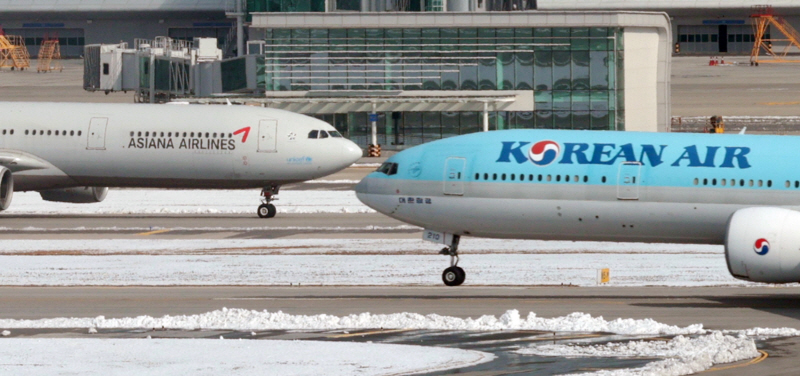Customers who have earned Asiana Airlines miles by flying the airline may be able to convert them to Korean Air miles at a one-to-one ratio after the merger of the two carriers, which is currently set for the end of 2026. Miles accumulated through other mechanisms, such as credit cards and hotel stays, will receive less favorable rates.
The mileage swap ratio has been one of the most contentious issues among customers of the airlines, with many having predicted that Asiana’s miles would be valued lower than Korean Air’s.
“Korean Air is working to implementing a 1:1 ratio for transferring Asiana miles, though the details are still under discussion,” a source with knowledge of the matter told the Korea JoongAng Daily.

The source did not provide specific details about the transfer of miles acquired through credit cards but added that the ratio will be “lower than the 1:1 ratio.”
Korean Air acquired 63.9 percent of compatriot Asiana on Dec. 12 to end its long-anticipated four-year merger plan. The two full-service airlines will be integrated at the end of 2026. Asiana will operate as a Korean Air subsidiary for two years.
Korean Air has until mid-June to submit detailed plans of the integration process to the Fair Trade Commission for approval, including the mileage transfer, which has remained one of its nuisances.
The country’s largest carrier declined to confirm the plan but said that “nothing has been decided” and it is speaking with “consulting firms for a suitable transition ratio,” adding that the fixed rate will be announced by the second half of the year.
If the 1:1 ratio is applied, it will likely relieve customers’ mounting anxieties regarding their acquired miles and questions of whether they could become unusable or undervalued.
In fact, the two airline companies have similar mileage accumulation levels for those earned from flights according to their mileage programs.
Korean Air’s standard economy ticket from Incheon to Los Angeles on a weekend in March costs 1.048 million won ($717) and earns 5,973 miles. An Asiana flight on the same day and the same route costs 1.047 million won, only 1,000 won fewer, and accumulates 5,973 miles, according to their respective websites.
“The 1:1 ratio could work as a settling compromise to increase customers’ acceptance and satisfaction,” said Hwang Yong-sik, a business professor at Sejong University. “The one-to-one ratio will be less disputable when applying miles earned for boarding flights than for those acquired through credit card usage.”
Delta Air Lines applied a 1:1 ratio to mileage transfers from Northwest Airlines in the wake of their merger in 2008, and United Airlines also implemented the one-to-one ratio when integrating with Continental Airlines.
The push for a 1:1 ratio also came after now-suspended President Yoon Suk Yeol in March last year vowed to make sure that “no one suffers any loss in mileage benefits, not even a single mile.”
However, the miles gained through the use of products or services from partnered companies is still an issue. Those include miles accumulated through the use of credit cards, hotels and car rental agencies partnered with the airlines.
Though the standard varies for each product or service, one Korean Air mileage point is earned for every 1,500 won spent, while it only takes 1,000 won to accrue one Asiana mile.
Unused Korean Air miles stood at 2.55 trillion won as of the end of September last year, which it reflected as deferred revenue, a type of liability, in the carrier’s financial statements. Asiana’s came in at 981.9 billion won.
BY SARAH CHEA [chea.sarah@joongang.co.kr]




